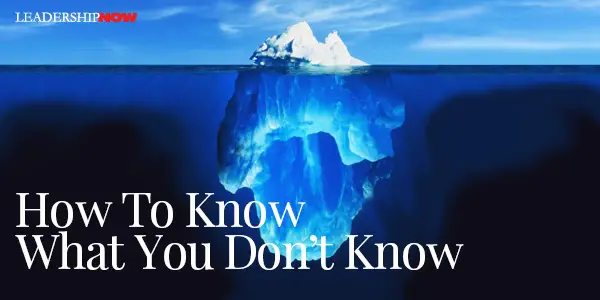 |
 |
02.27.09

How To Know What You Don’t Know
HAVING studied some of the biggest decisions of our time, Michael Roberto is an expert on decision making. But his new book is not about decision-making. Not exactly anyway. Something Robert McNamara said to him made him take a step back. McNamara said that while business schools dutifully teach decision making, in the real world, identifying the true problem often proves to be the bigger issue. Have you ever found that you were working on a solution to the wrong problem? Of course, knowing that a problem exists at all is first the critical step. Too frequently, we uncover the problem too late and the small issue has become a major problem. By now, we are all well acquainted with this scenario. Roberto writes, “Small problems often precede catastrophes. In fact, most large-scale failures result from a series of small errors and failures, rather than a single root cause.”Peggy Noonan recently wrote in her weekend column, “Every new president starts out fresh, in part because he doesn’t know what he doesn’t know. Ignorance keeps you perky.” It also makes you vulnerable. So a leader must become a good problem-finder. We need to get good at knowing what we don’t know. The purpose of Michael Roberto’s book, Know What You Don’t Know, is to help us do just that – become an expert at finding problems. It’s an important book on a timely – if not ever-present – issue. Problem-finding is an ongoing process and a bit of a trick. Simply asking won’t give you the answer. People are prone to tell you what you want to hear. People tend to do – and think nothing of – what makes sense to them, but it might not make sense in the context of what you are trying to accomplish. So you have to learn to read between the lines and connect the dots. It requires intuition. Improving that capability is essential to your success so that when you do put two and two together, you get four and not something else. You have to create a learning environment where people are allowed to make mistakes and learn from them. And they need to be trained how to communicate their thoughts and allow others to communicate theirs without shutting them down. Through numerous examples he shows how people have improved their problem-finding skills. Many of these examples can be applied in a wide variety of contexts. A successful leader must develop the mindset of a problem-finder. This, Roberto says, is not just another set of behaviors and competencies. It begins with “a certain level of intellectual curiosity. You must be willing to ask questions, seeking always to learn more about both the familiar and the unfamiliar…. Perhaps most importantly, you must be willing to question your own prior judgments and conclusions.” (And have enough humility to even think that that is necessary.) You also must “embrace systemic thinking.” A good problem-finder recognizes “that small problems often do not occur due to the negligence or misconduct of an individual. Instead, small errors frequently serve as indicators of broader systemic issues in the organization.” It might be prudent, in the aftermath of a major problem, to use it as an opportunity to look at the “whole” organization for contributing factors. Finally, Roberto says you need to have a healthy paranoia. “Effective problem-finders acknowledge that every organization, no matter how successful, has plenty of problems.” And that’s OK. “Effective problem-finders acknowledge their personal fallibility, rather than cultivating an aura of invincibility.” Roberto concludes, “Successful leaders do not see problems as threats. They see every problem as an opportunity to learn and improve.” Leave no stone unturned. 
Posted by Michael McKinney at 12:11 AM
|
BUILD YOUR KNOWLEDGE
 

How to Do Your Start-Up Right STRAIGHT TALK FOR START-UPS 
Grow Your Leadership Skills NEW AND UPCOMING LEADERSHIP BOOKS 
Leadership Minute BITE-SIZE CONCEPTS YOU CAN CHEW ON 
Classic Leadership Books BOOKS TO READ BEFORE YOU LEAD |